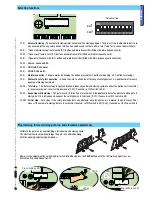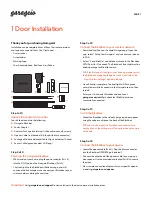
ENGLISH
p.
2
-
M
an
u
al
c
od
e:
11
9
B
F
0
3
11
9
B
F
0
3
ve
r.
2
04/2
0
14
© 0
9
/2
0
10 © C
A
M
E c
an
ce
lli
A
uto
m
ati
ci
S
.p.
A
. - T
h
e d
ata a
n
d i
nf
or
m
ati
on i
n th
is
m
an
u
al
m
ay b
e c
h
an
g
ed at a
ny ti
m
e a
n
d w
ith
ou
t o
b
lig
ati
on o
n th
e p
art of C
am
e C
an
ce
lli
A
uto
m
ati
ci
S
.p.a. to n
otify s
ai
d c
h
an
g
es.
Foreword
• This product should only be used for the purpose for which it was
explicitly designed. Any other use is considered dangerous. CAME Cancelli
Automatici S.p.A. is not liable for any damage resulting from improper,
wrongful or unreasonable use • Keep these warnings with the installation
and use manuals issued with the automation system.
Before installing
(preliminary check: in case of a negative outcome, do not proceed until you
have complied with the safety requirements)
• Check that the part you intend to automate is in good mechanical
condition, balanced and aligned, and that it opens and closes properly.
Make sure that proper mechanical stops are already in place • If the
operator will be installed at a height of less than 2.5 m from the ground
or other access level, check whether you will need any protections and/
or warnings • Any leaves fi tted with pedestrian entrances onto which you
will install an operator must have a blocking mechanism when the leaf is
in motion • Make sure that the opening of the automated leaf is not an
entrapment hazard as regards any surrounding fi xed parts • Do not mount
the operator upside down or onto any elements that may fold under its
weight. If needed, add suitable reinforcements at the points where it is
secured • Do not install onto leaves not on level ground • Check that any
lawn watering devices will not wet the operator from the bottom up.
Installation
• Carefully section off the entire site to prevent unauthorised access,
especially by minors and children • Be careful when handling operators
that weigh more than 20 kg. In case, procure the tools required for safe
gate movement • All opening commands (buttons, key selectors, magnetic
readers etc.) must be installed at least 1.85 m from the perimeter of the
area of turnstile movement, or where they cannot be reached from outside
through the turnstile. In addition, direct controls (button, touch sensitive
keys, etc.) must be installed at a height of at least 1.5 m and must not
be accessible to the public • All ‘hold-to-run’ commands must be placed
where the moving gate leaves, transit areas and driveways are completely
visible • If missing, apply a permanent label that shows the position of the
release mechanism • Before delivering to the user, check that the system
is EN 12453 (impact test) standard compliant. Make sure that the operator
has been properly adjusted and that the safety and protection devices as
well as the manual release are working properly • Where necessary and in
plain sight, apply the Warning Signs (e.g. gate plate)
Special instructions and advice for users
• Keep the gate’s area of operation clean and clear of any obstacles. Check
that there is no vegetation in the area of operation of the photocells and
that there are no obstacles in the area of operation of the operator • Do
not allow children to play with the fi xed command devices, or in the gate’s
area of operation. Keep any remote control devices (i.e. transmitters) or any
control devices away from children as well, to prevent the operator from
being activated accidentally •The operator is not designed to be used by
persons (including children) whose physical, sensorial or mental capacities
are limited, or who are lacking in experience or knowledge, unless said
persons can be supervised or given instructions regarding using the
operator by a person responsible for their safety • Frequently check the
system, to see whether any anomalies or signs of wear and tear appear
on the moving parts, on the component parts, on the securing points, on
the cables and any accessible connections. Keep any joints (i.e. hinges)
lubricated and clean, and do the same where friction may occur (i.e. slide
rails) • Perform functional tests on photocells and sensitive edges every
six months. To check that the photocells work, pass an object in front of
them during closing. If the operator reverses the direction of movement or
comes to a halt, the photocells work correctly. This is the only maintenance
operation that must be carried out while the operator is live. Ensure that the
glass on the photocells is kept clean (use a cloth slightly moistened with
water; do not use solvents or any other chemicals as these could damage
the devices) • If the system requires repairs or modifi cations, release the
operator and do not use it until safety conditions have been restored • Cut
off the power supply before releasing the operator for manual openings
and before any other operation, to prevent dangerous situations. Read the
instructions • If the power cable is damaged, it must be replaced by the
manufacturer or the technical assistance service or by a person with a
similar qualifi cation so as to prevent any risks • It is STRICTLY FORBIDDEN
for users to perform OPERATIONS THEY ARE NOT EXPLICITLY REQUIRED
AND ASKED to do in the manuals. For repairs, adjustments and extraordinary
maintenance, CONTACT THE SPECIALIST TECHNICAL SERVICE CENTRE •
On the periodic maintenance log, note down the checks you have done.
Special instructions and advice for all
• Avoid working near the hinges or moving mechanical parts • Stay clear
of the gate’s area of operation when in motion • Do not resist the direction
of movement of the gate; this may present a safety hazard • At all times
be extremely careful about dangerous points that must be indicated by
proper pictograms and/or black and yellow stripes • When using a selector
or command in ‘hold-to-run’ mode, keep checking that there are no people
in the area of operation of the moving parts. Do this until you release the
command • The gate may move at any time without warning • Always cut
the power when cleaning or performing maintenance.
CAUTION!
important personal safety instructions:
READ CAREFULLY!
Danger of hand crushing
Danger - live parts
No transit during the manoeuvre
Danger of crushing feet



































